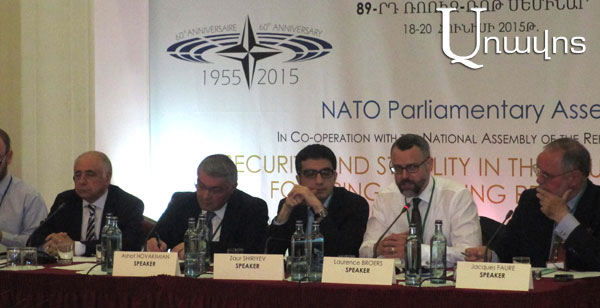According to Zaur Shiriyev Azerbaijan wants Minsk Group Co-Chair countries to bring the conflict onto the international agenda
“Azerbaijan frequently criticizes the OSCE Minsk Group’s mediation framework; there are several reasons for this approach, but the reasons behind the criticism are often misunderstood”, said researcher for Russia and Eurasia Program of London-based “Chatham House” Zaur Shiriyev.
According to him if we look at the “minimums” and “maximums” expected from the Minsk Group’s work, the minimum is to bring together conflict parties and support conflict resolution activities: ”The maximum is recommending the signature of a “peace agreement” or an earlier “framework agreement”, and to contribute to the process of reaching such an agreement. These benchmarks, the ‘maximums’, were witnessed at the peak of the Minsk Group’s activity in the 1990, with the creation of three potential settlement plans, and later the so-called Madrid Principles, which sought to become the core principles of a prospective peace agreement”
He noted that from the Azerbaijani perspective, the Minsk Group is far from realizing its “maximums”: “It has failed to bring together conflict parties and facilitate consensus on a “framework agreement”. There has been no recent progress on the Madrid Principles, partially agreed in 2007 and updated in 2009. The parties unanimously agreed to accept Madrid Principles, but the substantive elements of the principles, including withdrawal from occupied territories, return of refugees and internally displaced people, have not been implemented, and has there been any effort in this direction. Meanwhile, the fragility of the Madrid Principles lies in the fact that there is no signed agreement.Therefore, Azerbaijan wants either to get rid of the redundant Minsk Group, or revise its format by adding other countries, to reinvigorate the process with fresh faces. The goal of this is not to modify the composition of Minsk Group in favor of Azerbaijan and change the “geopolitical” and “power” balance. What matters is not increasing the number of co-chairs, but improving the format. Azerbaijan wants Minsk Group Co-Chair countries to bring the conflict onto the international agenda and to chair regular and scheduled negotiations at the presidential level. More agenda-based and long-term commitment is needed; the failure of France’s recent effort was due in part to the ad hoc nature of the meeting”.
Read also
He added that in his opinion there is need a work to clear the way for official negotiations: “An official negotiations framework is needed, with an agenda negotiated by mediators to better prepare the parties. As a part of this, the conflict parties should work towards reaching a framework agreement. This needs to include the Madrid Principles in clearer terms, reducing the scope for manipulation and misinterpretations. At present, there are increasingly serious obstacles to the vision of peace contained in the Madrid Principles. A clear negotiation format that includes a timeline for reaching the framework agreement will improve official and public understanding of what to expect from the conflict resolution process. The notion of ‘compromise’ is misunderstood in the negotiations process. I think, in order to create a peaceful environment Armenia should start withdrawing from two or three occupied territories- especially those like Aghdam and Fuzuli which do not threaten the so-called security belt- which will create a more peaceful environment and make the peace process more tangible”.
Ami CHICHAKYAN






















































